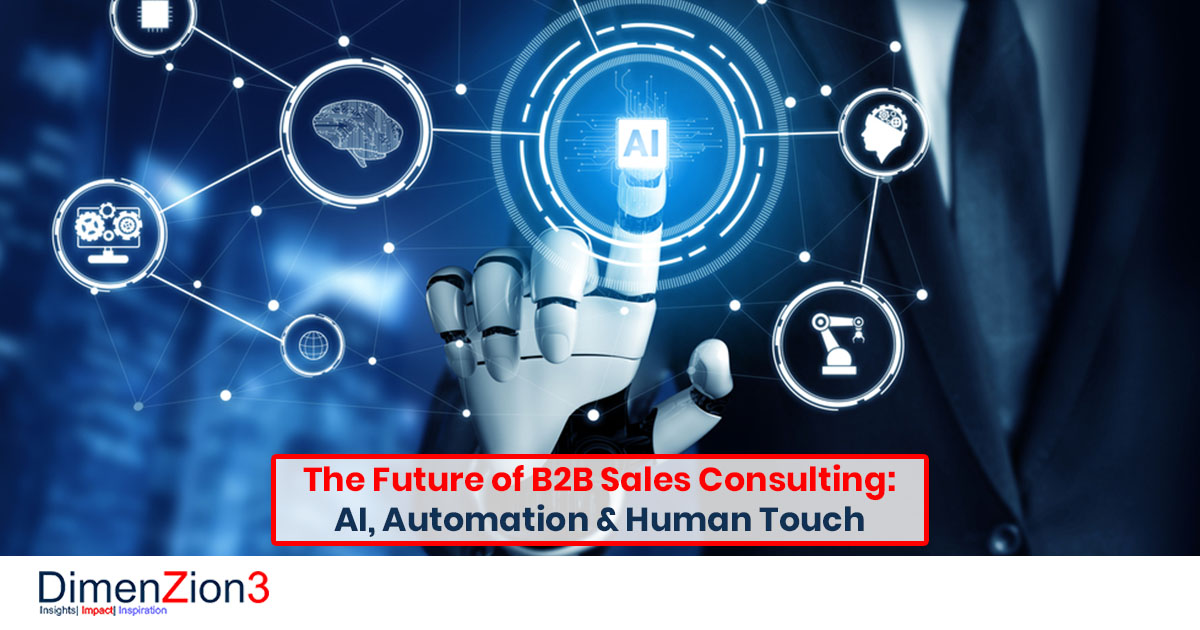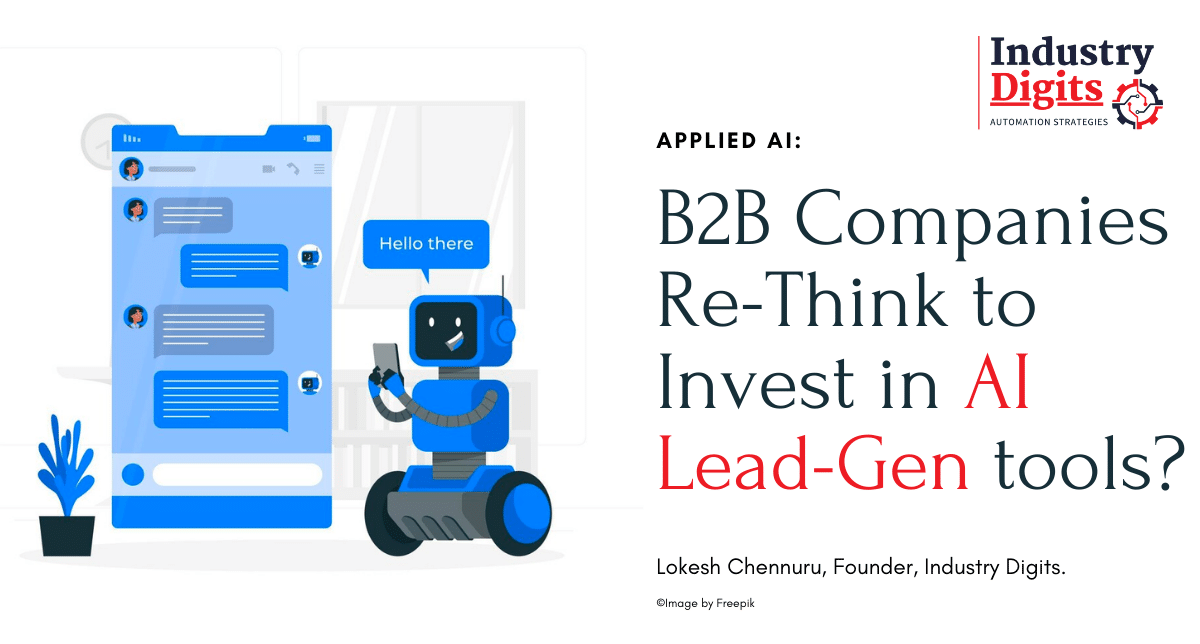How Growth Systems For B2B supports data-driven decision-making
Transform Your Business: Just How AI Automation Is Transforming B2B Workflow
AI automation is improving B2B operations in substantial means. Business are embracing this technology to streamline process and boost efficiency. As jobs become automated, services can focus on tactical growth instead than ordinary processes. The ramifications of these adjustments are profound, influencing whatever from client communications to supply chain management. Understanding this improvement is important, as the future of service depend upon the reliable integration of AI into day-to-day procedures. What exists ahead in this advancing landscape?
Comprehending AI Automation in B2B Context
As organizations significantly seek performance, understanding AI automation within the B2B context comes to be important. AI automation describes the application of expert system innovations to enhance and improve service processes. In B2B environments, this can materialize in various types, such as automating data access, enhancing supply chain logistics, or enhancing stock monitoring. Organizations leveraging AI automation can lower functional prices, reduce human mistake, and increase performance. Moreover, AI devices can analyze large quantities of information to offer actionable insights, enabling educated decision-making. The integration of AI right into B2B procedures not just changes conventional workflows yet additionally promotes agility and scalability, permitting services to adjust to market changes promptly and properly. Accepting this technology is essential for remaining affordable in today's digital landscape.
Enhancing Consumer Experience With AI
Just how can AI transform customer communications in the B2B market? AI improves consumer experience by supplying personalized, prompt, and effective service. Virtual aides and smart chatbots can take care of queries 24/7, guaranteeing customers obtain instant feedbacks. Predictive analytics enable organizations to expect consumer needs, customizing offerings appropriately. AI-driven systems can analyze client data, permitting targeted marketing methods and improved interaction. In addition, sentiment evaluation tools analyze customer feedback, assisting companies fine-tune their services. By automating regular jobs, AI liberates personnels to concentrate on high-value interactions, promoting more powerful relationships. The combination of AI not just streamlines communication yet also develops depend on and commitment, ultimately raising the general consumer experience in the competitive B2B landscape.
Improving Supply Chain Administration With AI
AI plays an essential function in enhancing supply chain monitoring via anticipating analytics and automated stock control (Growth Systems For B2B). By leveraging anticipating analytics, companies can expect need fluctuations and change their procedures accordingly. Automated inventory systems even more improve effectiveness by making sure supply degrees are kept, decreasing waste and enhancing total performance

Anticipating Analytics Benefits
While numerous organizations face challenges in handling intricate supply chains, anticipating analytics offers a transformative option by leveraging substantial quantities of data to forecast patterns and enhance procedures. By examining historic information alongside real-time inputs, predictive analytics allows firms to recognize patterns and anticipate future demands. This foresight enables for more informed decision-making, enhancing effectiveness and minimizing prices. Additionally, businesses can proactively deal with possible disturbances by predicting supply chain traffic jams and adjusting strategies as necessary. The assimilation of anticipating analytics not just boosts supply monitoring however likewise promotes stronger relationships with distributors and consumers via prompt actions to market shifts. Ultimately, the adoption of predictive analytics empowers companies to remain affordable in a progressively dynamic business environment.
Automated Inventory Control
As organizations significantly count on anticipating analytics to maximize supply chain operations, automated inventory control arises as a powerful ally in this initiative. By leveraging AI-driven innovations, firms can enhance precision in inventory tracking, decrease stockouts, and minimize excess supply. Automated systems evaluate real-time information, enabling services to anticipate need changes and change stock degrees accordingly. This not just enhances order fulfillment but additionally enhances cash money circulation management by decreasing holding costs. Additionally, AI can determine patterns in buying actions, allowing even more informed decision-making regarding distributor relationships and purchase methods. Ultimately, automated supply control not only enhances operational efficiency yet likewise boosts customer satisfaction by making certain product accessibility, solidifying its duty as an essential component in contemporary supply chain monitoring.
Data-Driven Choice Making Powered by AI
In today's competitive landscape, organizations significantly depend on data-driven decision-making to improve operational effectiveness and critical planning. Artificial intelligence plays an essential function in this transformation by evaluating huge quantities of information swiftly and precisely. AI algorithms determine patterns, patterns, and abnormalities that human experts could ignore, making it possible for businesses to make educated decisions based on real-time insights - Minarik AI. This ability allows business to forecast market changes, maximize source allowance, and customize their offerings to consumer demands. Additionally, AI-driven analytics help with danger analysis and monitoring, guaranteeing that companies can browse unpredictabilities successfully. By leveraging these innovative tools, businesses not only boost their decision-making processes but also acquire an affordable advantage in their particular markets, cultivating development and innovation
Automating Repetitive Tasks to Boost Efficiency
Simplifying recurring jobs with automation considerably boosts performance within B2B procedures. By applying AI-driven remedies, firms can remove ordinary activities such as information entry, billing handling, and record generation. This change enables workers to focus on higher-value jobs, cultivating creative thinking and critical reasoning. Automating these taxing procedures not just minimizes human mistake however also accelerates workflow performance. In addition, services can accomplish consistent outcomes and enhanced accuracy, which is crucial in maintaining customer fulfillment. The integration of automation devices allows organizations to allot resources better, guaranteeing that groups can respond promptly to market needs. Ultimately, taking on AI for repeated jobs is a tactical move that changes operational abilities and drives overall organization growth.
Integrating AI With Existing Company Procedures
When integrating AI with existing business procedures, many companies encounter difficulties. These obstacles commonly stem from a lack of recognizing concerning just how AI can complement existing process. Successful assimilation calls for a thorough assessment of existing operations to recognize areas where AI can include worth. Organizations should additionally guarantee that their teams are outfitted with the required abilities to utilize AI tools successfully - AI Automation For B2B. In addition, smooth assimilation depends upon the compatibility of AI innovations with heritage systems. Companies typically locate it advantageous to embrace a phased strategy, piloting AI applications in specific departments before a wider rollout. This technique enables for changes based on initial feedback, guaranteeing smoother shifts and maximizing the potential benefits of AI automation in enhancing productivity and effectiveness
Future Patterns in AI Automation for B2B Firms
As B2B companies look to the future, enhanced information Get the facts analytics is readied to play a crucial function in driving decision-making processes. Intelligent process automation will certainly also emerge as an essential pattern, boosting and enhancing procedures effectiveness. These innovations assure to reshape just how organizations run, eventually causing more nimble and receptive organizations.
Improved Data Analytics
While companies progressively rely upon data-driven decisions, the duty of AI in improving data analytics is becoming more essential in B2B procedures. AI innovations help with the collection and analysis of large datasets, allowing companies to reveal important understandings that drive critical planning. Anticipating analytics powered by AI enables companies to anticipate market trends and consumer behavior with better accuracy. Additionally, equipment discovering algorithms boost data interpretation, determining patterns that human experts might overlook. This causes more enlightened decision-making and enhanced source allotment. As B2B companies remain to embrace AI-driven analytics, they can anticipate better functional performance, improved consumer experiences, and a competitive side on the market. The future of information analytics in B2B rests on integrating innovative AI capabilities.
Intelligent Refine Automation
Smart Refine Automation (IPA) is positioned to transform B2B procedures by seamlessly integrating AI innovations with traditional service procedures. This ingenious technique combines robotic process automation (RPA) with advanced AI capabilities, allowing companies to improve effectiveness and accuracy. Companies can automate recurring tasks, such as data entrance and invoice processing, permitting staff members to focus on calculated initiatives. IPA also leverages equipment discovering and all-natural language handling, enhancing decision-making through real-time data analysis. As companies significantly adopt IPA, they can expect significant cost decreases and improved client experiences. Future patterns suggest an expanding reliance on IPA for scalability and adaptability, positioning companies to prosper in an ever-evolving marketplace. Welcoming IPA will certainly be essential for maintaining competition in the digital age.
Frequently Asked Questions
What Industries Advantage The Majority Of From AI Automation in B2B Operations?

Exactly How Can Small Companies Implement AI Automation Effectively?
Local business can implement AI automation effectively by recognizing repeated tasks, picking suitable tools, incorporating services gradually, training staff, and continually examining performance to maximize processes, making sure a smooth changeover and making the most of effectiveness.
What Are the Prices Linked With AI Automation Implementation?
The costs connected with AI automation application usually include software application acquisition, infrastructure upgrades, educating staff, recurring maintenance, and prospective consultation costs. These expenses can vary substantially based upon the scale and intricacy of the automation solutions selected.
How Do I Gauge ROI From AI Automation Initiatives?
To gauge ROI from AI automation initiatives, one must analyze price financial savings, productivity enhancements, and earnings growth against application expenses. Tracking vital efficiency indicators in time supplies beneficial understandings into efficiency and general roi.
What Abilities Are Required to Take Care Of AI Automation Projects?
Reliable management of AI automation jobs needs abilities in job administration, data evaluation, programs, and recognizing AI modern technologies. In addition, solid interaction, analytic abilities, and versatility are essential for maneuvering the complexities of such initiatives.
As companies significantly look for effectiveness, comprehending AI automation within the B2B context becomes important. The integration of AI into B2B procedures not only transforms traditional workflows yet also promotes agility and scalability, permitting organizations to adjust to market adjustments promptly and successfully. While services progressively depend on data-driven decisions, the role of AI in enhancing information analytics is coming to be a lot more necessary in B2B operations - AI Automation For B2B. Intelligent Refine Automation (IPA) is poised to transform B2B operations by effortlessly incorporating AI technologies with conventional company procedures. Efficient management of AI automation tasks needs abilities in job management, information analysis, shows, and comprehending AI technologies